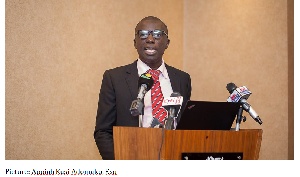- Home - News
- Elections 2024
- News Archive
- Crime & Punishment
- Politics
- Regional
- Editorial
- Health
- Ghanaians Abroad
- Tabloid
- Africa
- Religion
- Photo Archives
- Press Release
General News of Thursday, 8 May 2025
Source: www.ghanawebbers.com
CUTS calls for urgent regulatory reforms in public sector recruitment
CUTS International, a leading policy research and advocacy organization, is calling for urgent reforms in Ghana’s public sector recruitment system. They cite issues like opacity, politicization, and lack of meritocracy.
Appiah Kusi Adomako, the West Africa Regional Director of CUTS International, highlighted flaws in recruitment practices. He described the current system as favoring political connections over merit.
Recruitment into Ministries, Departments, and Agencies (MDAs) should be open and competitive. However, job openings at major institutions are rarely advertised publicly. The process often relies on ‘protocol lists’ from influential figures.
This situation fosters nepotism and secrecy. It disadvantages qualified job seekers without political connections. Rural candidates from places like Damongo and Tamale face significant barriers.
Adomako emphasized that this issue transcends political parties like NDC or NPP. Any future government could perpetuate the current system without reforms. A merit-based recruitment process is essential to create fairness.
He contrasted the politicized civil service with the transparent hiring processes in security services. These emphasize merit and regional diversity.
Adomako warned that politicized hiring deepens loyalty to political parties within public institutions. Employees may feel obligated to support the party that hired them. This leads to marginalization when governments change.
He noted that tertiary education has become a recruitment ground for party supporters rather than innovators or critical thinkers. This trend results in declining professionalism and eroded public trust.
To address these issues, CUTS International proposes five key reforms:
1. Create a Centralised Recruitment Portal
A digital platform should serve as the single entry point for all public sector job applications.
2. Mandatory Public Advertising of Vacancies
All public institutions must publicly advertise job openings for at least 30 days across various media channels.
3. Merit-Based Assessment and Interviews
The recruitment process should include standardized tests and competency-based interviews supervised by independent panels.
4. Annual National Recruitment Calendar
A publicly available calendar should promote predictability in hiring practices each year.
5. Digital Records and Annual Audits
All recruitment activities must be digitally recorded with annual audits made publicly available.
Adomako stressed that these reforms are necessary and achievable. If Ghana can digitize educational results, it can also improve public sector recruitment processes.
CUTS International urges the Public Services Commission to act now to rebuild trust in Ghana’s public sector. A transparent recruitment system is vital for fairness and national development.











